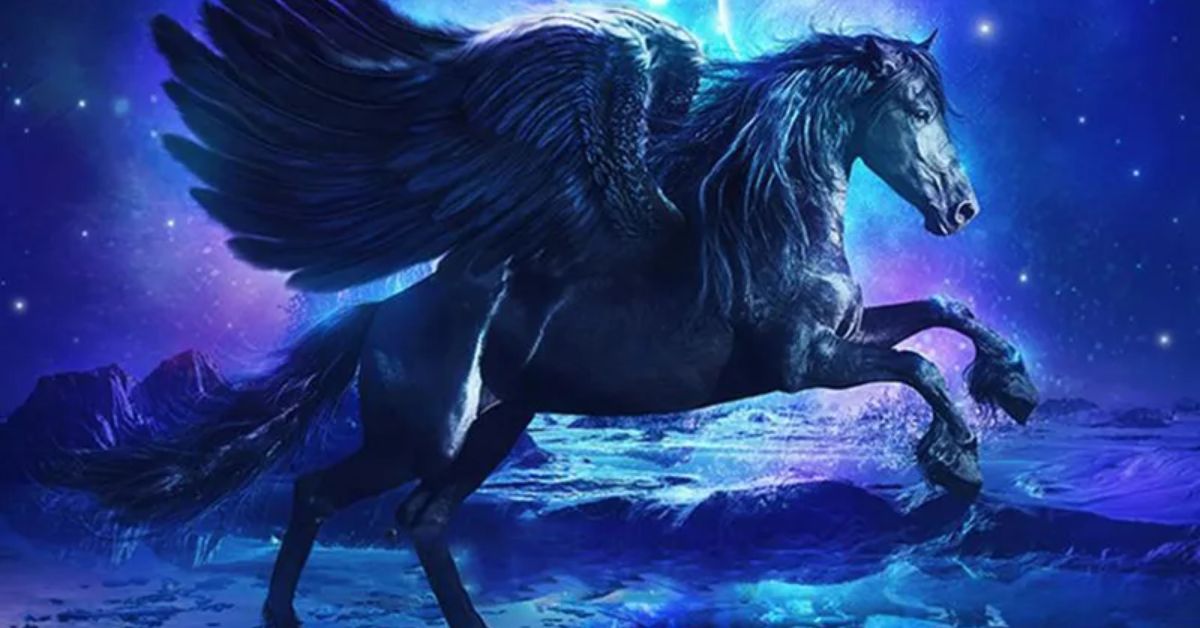A Pegasus is a mythical horse with wings. It comes from Greek mythology. This creature symbolizes freedom, speed, and magic. It has inspired stories, art, and imagination for centuries.
Have you ever dreamed of naming a magical creature? Picking the right name for a Pegasus feels special. It’s like giving wings to your imagination. Let’s explore some amazing ideas together.
Pegasus names are as magical as the creature itself. They can be inspired by mythology, nature, or fantasy. These names reflect beauty, power, and mystery. Choosing one can be a fun and creative experience.
Interesting Facts About Pegasus
The Pegasus is one of the most famous creatures in Greek mythology. Known for its beauty and magical abilities, this winged horse has captured imaginations for centuries. Here are some fascinating facts about Pegasus that you may not know:
- Pegasus was born from the blood of Medusa when Perseus killed her.
- It is said that Pegasus helped heroes by carrying them to victory in battles.
- The creature was known to create springs of water by striking the ground with its hooves.
- Pegasus became a constellation in the night sky, placed there by Zeus.
- In Greek mythology, it symbolizes inspiration, freedom, and strength.
- The winged horse is often linked to the Muses, inspiring art and poetry.
- Pegasus is not just a single being; its image has inspired many mythical creatures in different cultures.
- The creature’s name is derived from the Greek word “pegai,” meaning springs or waters.
Famous Pegasus Names
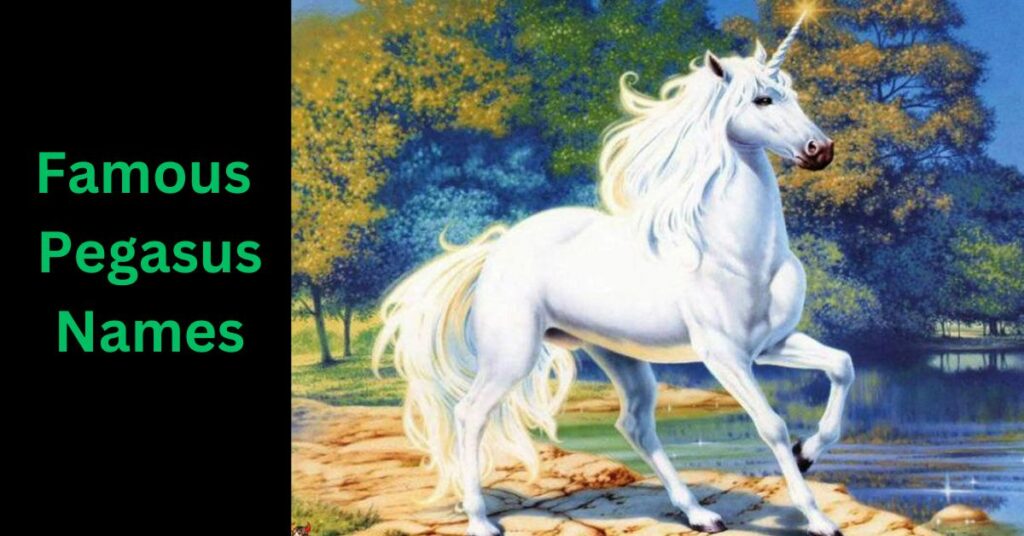
Some famous Pegasus names come from mythology and popular culture. Examples include Pegasus, Bellerophon’s flying horse, and Sleipnir, a Norse counterpart. My Little Pony Pegasus names, like Rainbow Dash, are also well-loved. These flying horse names inspire magical and mythic tales.
- Aella: Means “whirlwind” in Greek, symbolizing speed and agility. A mythical Amazon warrior associated with courage and swiftness.
- Aether: Represents the upper sky or pure air in Greek mythology, linked with lightness and celestial qualities.
- Alara: Of Turkish origin, meaning “ornament” or “adornment,” often tied to grace and beauty.
- Andromeda: A constellation named after a Greek myth, symbolizing strength and freedom.
- Arion: A divine horse in Greek mythology, renowned for its speed and immortality.
- Astral: Refers to the stars, symbolizing cosmic energy and mystical beauty.
- Aurora: Latin for “dawn,” representing new beginnings and radiance.
- Aquila: Latin for “eagle,” often tied to power and soaring ambitions.
- Bellerophon: Greek hero who tamed Pegasus, symbolizing bravery and ingenuity.
- Blackjack: Name of a famous Pegasus from the Percy Jackson series, known for loyalty and humor.
- Boreas: The Greek god of the north wind, symbolizing strength and a cold, commanding presence.
- Calypso: A nymph in Greek mythology, linked with beauty and enchanting melodies.
- Celestia: Derived from “celestial,” representing heavenly qualities and grace.
- Ceres: Roman goddess of agriculture, symbolizing nurturing and fertility.
- Chimera: A mythical creature, part lion, goat, and serpent, symbolizing ferocity and resilience.
- Chiron: A wise centaur from Greek mythology, associated with healing and knowledge.
- Cirrus: A type of high-altitude cloud, symbolizing elegance and lightness.
- Celeris: Pegasus’s sibling in some myths, representing swiftness and companionship.
- Comet: A celestial body, symbolizing speed, brilliance, and a trail of wonder.
- Cosmo: Of Greek origin, meaning “universe,” linked with infinite potential and wonder.
- Cygnus: A swan-shaped constellation, symbolizing elegance and serenity.
- Delphinus: A dolphin-shaped constellation, representing playfulness and connection to water.
- Eirene: Greek goddess of peace, symbolizing harmony and balance.
- Elara: A moon of Jupiter, symbolizing celestial elegance and beauty.
- Elysia: Derived from Elysium, the resting place of heroes in Greek mythology, symbolizing paradise.
- Elysium: Represents eternal peace and joy, a utopia in Greek myths.
- Eos: The Greek goddess of dawn, symbolizing light and renewal.
- Equinox: A celestial event symbolizing balance between light and dark.
- Eurus: The Greek god of the east wind, representing change and new beginnings.
- Felicity: Means “happiness” and “luck,” symbolizing joy and prosperity.
- Galadriel: A regal and wise character from The Lord of the Rings, symbolizing grace and power.
- Galaxy: Represents vastness, mystery, and connection to the stars.
- Guido: Italian name meaning “guide,” representing leadership and trust.
- Helios: The Greek god of the sun, symbolizing brilliance and vitality.
- Hermes: The Greek god of travel and communication, symbolizing speed and cleverness.
- Hespera: Represents the evening star, symbolizing twilight and serenity.
- Hyperion: A Titan in Greek mythology, associated with light and observation.
- Icarus: Greek mythological figure symbolizing ambition and the dangers of hubris.
- Ignis: Latin for “fire,” symbolizing passion and energy.
- Iris: The Greek goddess of the rainbow, representing hope and beauty.
- Luna: Latin for “moon,” symbolizing mystery and calm.
- Lyra: A constellation representing a lyre, symbolizing harmony and creativity.
- Mirage: Represents illusions and the mystical, often tied to desert imagery.
- Nebula: A cloud of gas and dust in space, symbolizing birth and cosmic creation.
- Nimbus: A radiant cloud or halo, symbolizing divine presence and power.
- Noctis: Latin for “night,” symbolizing mystery and darkness.
- Nyx: The Greek goddess of the night, representing power and mystery.
- Orion: A prominent constellation, symbolizing strength and adventure.
- Perseus: A Greek hero who saved Andromeda, symbolizing bravery and heroism.
- Phoenix: A mythical bird reborn from ashes, symbolizing immortality and renewal.
- Phaeton: Son of Helios, known for driving the sun chariot, symbolizing recklessness and ambition.
- Porkpie: Unique and whimsical, representing humor and individuality.
- Scipio: A Roman general, symbolizing strategy and leadership.
- Selene: The Greek goddess of the moon, representing light in the darkness.
- Seraphina: Derived from “seraph,” symbolizing purity and fiery passion.
- Solara: Linked to the sun, symbolizing vitality and warmth.
- Sirius: The brightest star in the night sky, symbolizing brilliance and prominence.
- Stardust: Represents magical essence and cosmic beauty.
- Stella: Latin for “star,” symbolizing guidance and inspiration.
- Stratos: Relates to the stratosphere, symbolizing high aspirations and elevation.
- Tempest: Represents powerful storms, symbolizing strength and turbulence.
- Thalassa: The Greek personification of the sea, symbolizing depth and mystery.
- Titan: Giant deities in Greek mythology, symbolizing strength and grandeur.
- Vega: A bright star in the Lyra constellation, symbolizing leadership and brilliance.
- Vespera: Latin for “evening star,” symbolizing peace and reflection.
- Zephyr: The Greek god of the west wind, symbolizing gentleness and springtime.
- Zephyra: Feminine form of Zephyr, symbolizing breezy elegance.
- Zorya: A Slavic goddess of dawn and twilight, symbolizing transitions and protection.
ALSO READ : Phoenix Names
Cute Pegasus Names
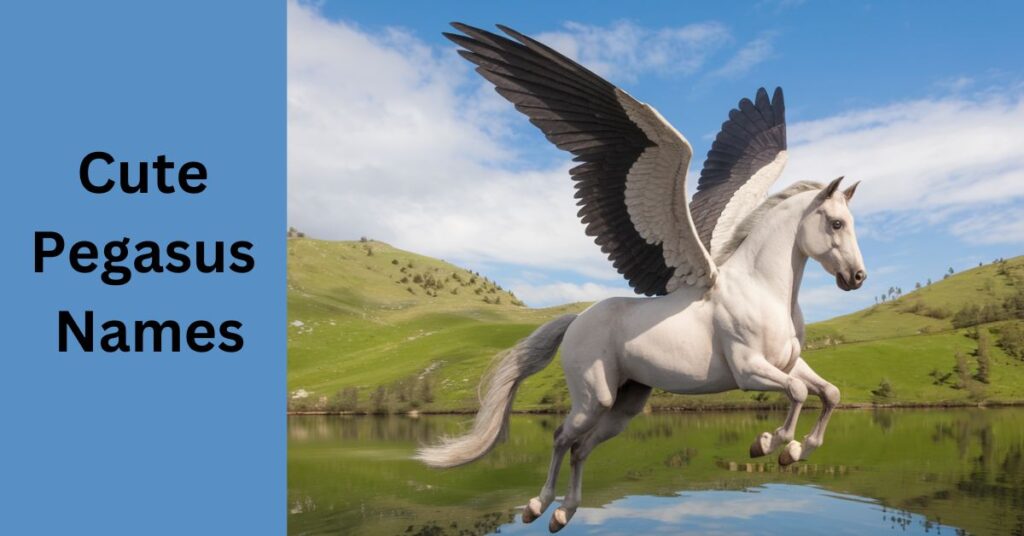
Cute Pegasus names like Stardust, Buttercup, and Angel reflect sweetness and charm. These names for a Pegasus are perfect for gentle, mythical creatures. Adding a playful Pegasus nickname like Sparkle makes them feel even more magical and endearing.
- Ailouros: A name inspired by cats, symbolizing grace and agility. Originates from ancient Greek, where “ailouros” means cat.
- Amara: A name meaning “eternal” or “unfading.” It has roots in Latin and Greek and exudes timeless beauty and charm.
- Aurora: Represents the dawn, radiating light and hope. Originates from Roman mythology, where Aurora is the goddess of the morning.
- Bambi: A playful and youthful name, evoking images of innocence and nature. Popularized by the iconic Disney deer.
- Bellatrix: Derived from Latin, meaning “female warrior.” Known for its celestial association as a star in the Orion constellation.
- Biscuit: A sweet and endearing name, evoking warmth and comfort. Perfect for a Pegasus with a soft personality.
- Bubbles: Playful and effervescent, reflecting joy and energy. Inspired by the lightness of floating bubbles.
- Buttercup: A bright and cheerful name inspired by the golden-yellow flower, symbolizing happiness and charm.
- Calypso: Rooted in Greek mythology, this name signifies hidden beauty and mystery, referencing the nymph who enchanted Odysseus.
- Chimera: Represents a mythical creature known for its strength and uniqueness. Originates from Greek mythology, symbolizing imagination.
- Cookie: A sweet and cozy name perfect for a cuddly Pegasus, reminiscent of delightful treats.
- Cuddles: A loving name that emphasizes warmth and affection, ideal for a Pegasus known for comforting others.
- Cupcake: Adorable and sweet, representing delight and joy. The name evokes an image of a playful and lovable Pegasus.
- Daisy: A fresh and cheerful name inspired by the bright and sunny flower, symbolizing purity and innocence.
- Doodle: A quirky and creative name, suggesting a Pegasus with an artistic and fun-loving personality.
- Echo: Rooted in Greek mythology, symbolizing sound and resonance. Represents a Pegasus with a melodic and enduring presence.
- Elysia: Derived from Elysium, the Greek paradise. Represents a heavenly and serene Pegasus.
- Fauna: Signifying wildlife and nature, this name reflects a Pegasus with an earthy and nurturing spirit.
- Flora: A name that embodies beauty and growth, inspired by the Roman goddess of flowers and spring.
- Fluffy: A charming name for a soft and cuddly Pegasus, evoking comfort and affection.
- Galatea: Originating from Greek mythology, the name means “milk-white” and represents purity and beauty.
- Gummy: A playful and quirky name, perfect for a Pegasus with a sweet and fun-loving personality.
- Harmonia: Signifying harmony and balance, this name originates from Greek mythology as the goddess of concord.
- Honey: Sweet and nurturing, this name symbolizes warmth and kindness, perfect for a gentle Pegasus.
- Ianthe: Meaning “violet flower,” this name has Greek origins and evokes beauty and elegance.
- Illyria: A mystical name referring to an ancient region, symbolizing exploration and enchantment.
- Liriope: From Greek mythology, representing a nymph and mother of Narcissus. Signifies grace and allure.
- Lorelei: Inspired by the German legend of the siren who lured sailors, symbolizing beauty and mystique.
- Luna: Associated with the moon, symbolizing calmness and intuition. It has Latin origins.
- Lyra: A celestial name inspired by the lyre constellation, symbolizing music and creativity.
- Marshmallow: A soft and squishy name, reflecting a Pegasus with a warm and comforting personality.
- Melia: Originates from Greek mythology, representing a nymph of honey and trees, symbolizing sweetness and nature.
- Merope: A celestial name from Greek mythology, one of the Pleiades sisters, symbolizing stars and light.
- Mistral: A name inspired by a strong Mediterranean wind, representing speed and freedom.
- Muffin: A sweet and cozy name perfect for a Pegasus with a cheerful and lovable personality.
- Naiad: Rooted in Greek mythology, referring to water nymphs. Symbolizes serenity and flow.
- Nerina: Meaning “sea nymph,” this name evokes a connection to water and tranquility.
- Nibbles: A playful name for a Pegasus with a curious and cheeky personality.
- Nixie: Derived from German folklore, representing a water spirit. Symbolizes fluidity and grace.
- Ophelia: A Shakespearean name that symbolizes beauty and tragedy, rooted in Greek meaning “help.”
- Pandora: From Greek mythology, meaning “all-gifted.” Represents curiosity and wonder.
- Peaches: A sweet and charming name evoking warmth and endearment, perfect for a lovable Pegasus.
- Peony: Inspired by the flower symbolizing prosperity and compassion, reflecting a Pegasus with a gentle soul.
- Periwinkle: A name inspired by the soft blue flower, symbolizing serenity and charm.
- Phaedra: Rooted in Greek mythology, symbolizing brightness and passion.
- Phoebe: Meaning “bright” and “pure,” it originates from Greek mythology, representing wisdom and radiance.
- Pixie: A playful and magical name, inspired by fairy-like creatures known for their mischievous charm.
- Selkie: Inspired by Scottish folklore, representing transformation and mystery.
- Seraphina: A heavenly name of Hebrew origin, symbolizing fiery angels and divine light.
- Sirena: A name of Spanish origin, meaning “mermaid,” symbolizing allure and grace.
- Skye: Represents the boundless sky, symbolizing freedom and imagination.
- Snickers: A lighthearted name for a playful Pegasus, evoking fun and joy.
- Snickerdoodle: A sweet and whimsical name inspired by the classic cinnamon cookie.
- Sprinkles: A cheerful and colorful name for a Pegasus with a lively and energetic personality.
- Sprout: A name that symbolizes growth and new beginnings, ideal for a nurturing Pegasus.
- Stardust: A magical name symbolizing cosmic beauty and dreams.
- Sunny: A bright and cheerful name, representing warmth and happiness.
- Sylph: Rooted in mythology, representing airy spirits, symbolizing grace and elegance.
- Talitha: Derived from Aramaic, meaning “little girl.” Represents innocence and charm.
- Thalia: From Greek mythology, one of the Muses. Represents joy and flourishing.
- Theia: A name from Greek mythology, symbolizing light and vision.
- Titania: Inspired by Shakespeare’s A Midsummer Night’s Dream, representing regal beauty and magic.
- Twilight: A name signifying mystery and transition, inspired by the beauty of dusk.
- Twinkle: A sparkling and delightful name for a Pegasus with a radiant personality.
- Vespera: A Latin name meaning “evening star,” symbolizing calm and wonder.
- Violette: A delicate name inspired by the violet flower, symbolizing love and modesty.
- Waffle: A quirky and sweet name for a Pegasus with a fun-loving and warm personality.
- Wisteria: A name inspired by the flowering vine, symbolizing devotion and elegance.
- Zephyra: Derived from “Zephyr,” the Greek god of the west wind, symbolizing breeze and lightness.
- Zephyros: A masculine variant of Zephyra, symbolizing swiftness and grace.
- Zinnia: A floral name symbolizing lasting affection and endurance.
- Zora: A Slavic name meaning “dawn,” symbolizing new beginnings and hope.
- Zorya: Inspired by Slavic mythology, representing the goddess of the morning star and protection.
ALSO READ : Unicorn Names
Funny Pegasus Names
For humor, choose funny Pegasus names like Wingnut, Cloud Cruncher, or Neigh-vigator. These mythical pet names bring smiles and a lighthearted touch to your flying horse name. A clever name adds personality and makes your Pegasus stand out.
- Bubbles the Brave: Known for courage despite its delicate name, this pegasus bravely tackles storms. Originates from humor, symbolizing strength under a whimsical title.
- Captain Cumulus: A proud flier navigating cloudscapes, blending humor with leadership. Reflects control and lighthearted majesty over fluffy skies.
- Choco-Pegasus: A pegasus with a sweet tooth or chocolatey appearance. Adds a fun, delicious twist to the mythical creature.
- Cloud Hopper: Quick and playful, this name captures the lively spirit of a pegasus jumping through clouds. Emphasizes joy and energy.
- Doodlebug: A quirky and artistic flier, this pegasus sounds like it leaves a trail of scribbles in the sky. Represents creativity and fun.
- Fizzy Flyer: Bubbly and cheerful, this name highlights a sparkling personality or flight style. Its effervescent charm makes it unique.
- Flapjack: Sweet and fluffy like the breakfast treat, this pegasus brings warmth and humor. Great for a lovable, friendly flyer.
- Fluffy McWings: A soft and huggable pegasus with humor in its feathery design. Perfect for a plush, comforting vibe.
- Frolicking Fizz: Playful and bubbly, this pegasus adds energy to frolics through the clouds. Represents carefree, effervescent motion.
- Frothy Flight: A whimsical name for a pegasus whose flight resembles frothy waves. Combines airy elegance with a splash of humor.
- Galloping Glitter: A shimmering beauty known for leaving trails of sparkle. Highlights speed with a dazzling touch of magic.
- Giggles the Galloper: This pegasus brings laughter wherever it goes. A lighthearted and comical name for a cheerful companion.
- Jumpy McWings: A bouncy, energetic pegasus with a humorous nod to its dynamic leaps. Captures an excited, playful personality.
- Neigh-sayer: A pegasus with sass, known for its witty comebacks. Its name cleverly plays on its horsey roots and contrarian attitude.
- Noodle Hooves: Flexible and silly, this pegasus dances through the air with wobbly charm. Evokes laughter and carefree movement.
- Pogo Pegasus: Bouncing high like a pogo stick, this pegasus is all about springy fun. Represents boundless energy and joy.
- Pony McFly: A humorous twist combining Pegasus lore with sci-fi flair, it suggests adventurous time-traveling rides.
- Pudding Puff: Sweet and fluffy like a cloud, this pegasus feels comforting and deliciously light. Evokes softness and charm.
- Sir Hops-a-Lot: A knightly, hopping pegasus with a quirky twist. Suggests nobility mixed with boundless energy and fun.
- Sir Neighs-a-Lot: A humorous, regal pegasus prone to witty remarks. Its name adds character, blending royal charm with horsey humor.
- Sparkle Hooves: A dazzling pegasus with shining hooves that glitter mid-flight. Symbolizes beauty and a magical presence.
- Trotting Tornado: A whirlwind of motion, this name emphasizes speed, chaos, and fun. Perfect for a pegasus with unstoppable energy.
- Waffle Wings: Light and crispy like a waffle, this pegasus brings a playful twist to its flights. Combines sweetness with humor.
- Whinny Houston: A punny name blending soulful singing with pegasus charm. Represents a melodious flyer with a lot of personality.
- Wiggles the Winged: A wiggly, joyful pegasus with extra energy. Its name highlights constant motion and whimsical charm.
- Wingin’ It: For the pegasus who improvises through life. A fun name capturing spontaneity and adventurous flying.
- Wingin’ it Willy: A more personal twist on improvisation, adding individuality to the carefree spirit of this pegasus.
Male Pegasus Names
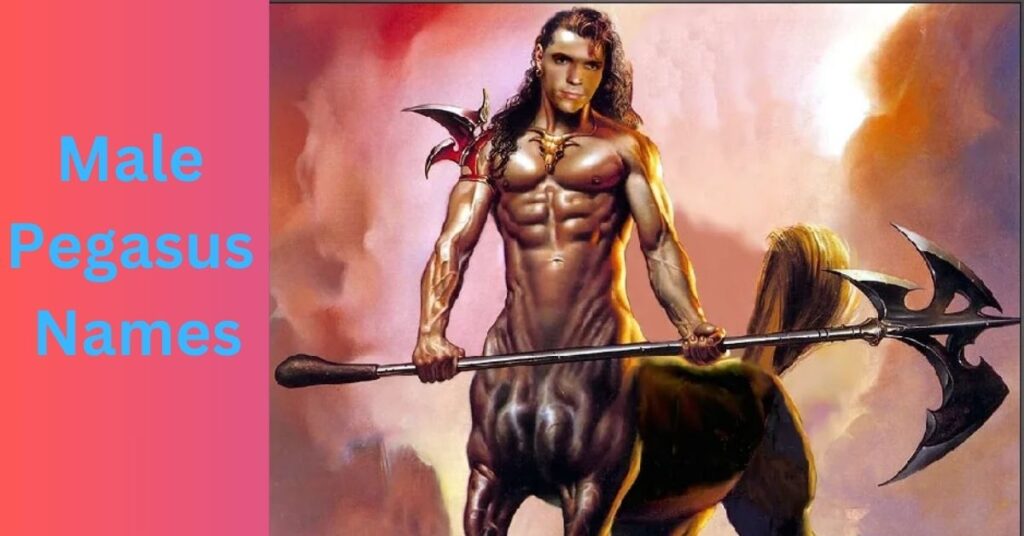
Strong and bold male Pegasus names include Thunder, Storm, and Apollo. These mythic names represent power and elegance. Inspired by heroes and gods, such as Bellerophon, who rode Pegasus, these names fit majestic, masculine winged horses.
- Aegis: Symbolizing protection, this name derives from Greek mythology and refers to a protective shield. Origin: Greece. Meaning: Defense and strength.
- Aegon: A regal name meaning “eternal protector.” Origin: Greek. Known for its association with legendary kings in literature.
- Ajax: A heroic name from Greek mythology, meaning “eagle.” Origin: Greece. Famous for its link to a powerful warrior in the Trojan War.
- Apollo: A celestial name tied to the god of light, music, and prophecy in Greek mythology. Origin: Greece. Meaning: Brilliance and creativity.
- Ares: The Greek god of war, embodying boldness and power. Origin: Greece. Meaning: Courage and combat strength.
- Archer: A skillful and agile name, signifying precision and focus. Origin: English. Meaning: Bow-wielding warrior.
- Argo: Inspired by the mythical ship of Jason and the Argonauts. Origin: Greece. Meaning: Adventure and exploration.
- Ash: A simple yet strong name representing resilience, from the ash tree. Origin: English. Meaning: Endurance and rebirth.
- Aurelius: A name radiating golden magnificence. Origin: Latin. Meaning: Golden or glowing.
- Balthazar: A royal and mystical name from the Three Wise Men in the Bible. Origin: Babylonian. Meaning: Protector of treasures.
- Bane: A dark and formidable name, meaning “cause of ruin.” Origin: English. Used to convey fearlessness and might.
- Blaze: Fiery and energetic, symbolizing speed and intensity. Origin: English. Meaning: Flame and brightness.
- Bolt: Swift and electrifying, inspired by lightning. Origin: English. Meaning: Sudden and powerful movement.
- Boreal: Associated with the northern lights, evoking mystery and wonder. Origin: Latin. Meaning: Of the north.
- Bram: A sturdy name rooted in Old English, symbolizing strength. Meaning: Bramble or thicket protector.
- Caelum: A celestial name meaning “heaven” or “sky.” Origin: Latin. Known for its ethereal beauty.
- Caius: A Roman name signifying joy. Origin: Latin. Meaning: Rejoicing or happiness.
- Caspian: Named after the Caspian Sea, evoking vastness and serenity. Origin: Persian. Meaning: Explorer of waters.
- Cavalier: A gallant and noble name representing chivalry. Origin: French. Meaning: Horseman or knight.
- Cedar: Earthy and grounding, inspired by the cedar tree. Origin: English. Meaning: Strength and durability.
- Cedric: A historical name with Anglo-Saxon roots, meaning “chief.” Known for leadership and valor.
- Chiron: A wise and noble name from the centaur in Greek mythology. Origin: Greece. Meaning: Teacher or healer.
- Cobalt: A name exuding brilliance, inspired by the blue metal. Origin: German. Meaning: Rare and vibrant.
- Corvus: A mysterious name linked to the raven in Latin. Origin: Roman. Meaning: Intelligence and foresight.
- Cyrus: A royal Persian name meaning “sun” or “throne.” Known for its link to Cyrus the Great.
- Damon: Meaning “loyal and constant,” this name originates from Greek mythology.
- Dante: A poetic and fiery name, meaning “enduring.” Origin: Italian.
- Darius: A Persian name denoting wealth and protection. Origin: Ancient Persia.
- Draco: A fierce name from the Latin word for “dragon.” Known for power and mystery.
- Drake: Symbolizing leadership, it means “dragon” or “male duck.” Origin: English.
- Eagle: Evoking keen sight and soaring freedom. Origin: English.
- Erebus: A shadowy name from Greek mythology, meaning “darkness.”
- Evander: A heroic name meaning “good man.” Origin: Greek.
- Falcon: A swift and agile bird name signifying speed. Origin: English.
- Finn: A charming name of Irish origin, meaning “fair” or “white.”
- Gale: Symbolizing the force of wind, it means “storm.” Origin: English.
- Griffin: A mythical creature representing strength and guardianship. Origin: Greek.
- Hercules: A legendary name tied to the hero of immense strength. Origin: Greek.
- Hyperion: A Titan in Greek mythology associated with the sun.
- Indigo: A vibrant and unique name tied to deep blue hues.
- Jasper: Derived from a gemstone, symbolizing value and uniqueness.
- Jett: A sleek name linked to the black gemstone or speed.
- Knight: Representing honor and valor, this name embodies chivalry.
- Lancelot: A noble knight from Arthurian legend, signifying loyalty.
- Leo: A Latin name meaning “lion,” symbolizing courage.
- Lynx: A sharp and observant name inspired by the wild cat.
- Mariner: Linked to the sea, representing exploration.
- Maverick: A free-spirited name meaning “independent.”
- Merlin: A wizardly name from Arthurian tales, meaning “hawk.”
- Nero: A bold Roman name meaning “powerful.”
- Nereus: A Greek sea god name symbolizing calm waters.
- Oberon: A regal and magical name from Shakespeare’s A Midsummer Night’s Dream.
- Orpheus: A poetic and musical name from Greek mythology.
- Percival: A knightly name linked to the search for the Holy Grail.
- Peregrine: Meaning “traveler” or “wanderer.” Origin: Latin.
- Phoenix: A mythical bird symbolizing rebirth and immortality.
- Questor: An adventurous name, meaning “seeker.”
- Ranger: A vigilant and outdoorsy name signifying guardianship.
- Remus: A Roman mythological name tied to the founding of Rome.
- Rex: A strong Latin name meaning “king.”
- Ronan: An Irish name meaning “little seal.”
- Rowan: A nature-inspired name tied to the rowan tree.
- Ryder: A spirited name meaning “horseman.”
- Sable: A dark and sleek name inspired by the black fur.
- Sterling: A refined name meaning “pure” or “excellent.”
- Talon: A sharp and fierce name inspired by a bird’s claw.
- Thorn: A rugged name symbolizing strength and defense.
- Titan: A mighty name denoting power. Origin: Greek mythology.
- Titanus: A grander variation of “Titan,” meaning “giant.”
- Triton: A Greek sea god name symbolizing strength and water mastery.
- Valor: A courageous name meaning bravery and honor.
- Vulcan: The Roman god of fire and metalwork, embodying creation.
Female Pegasus Names
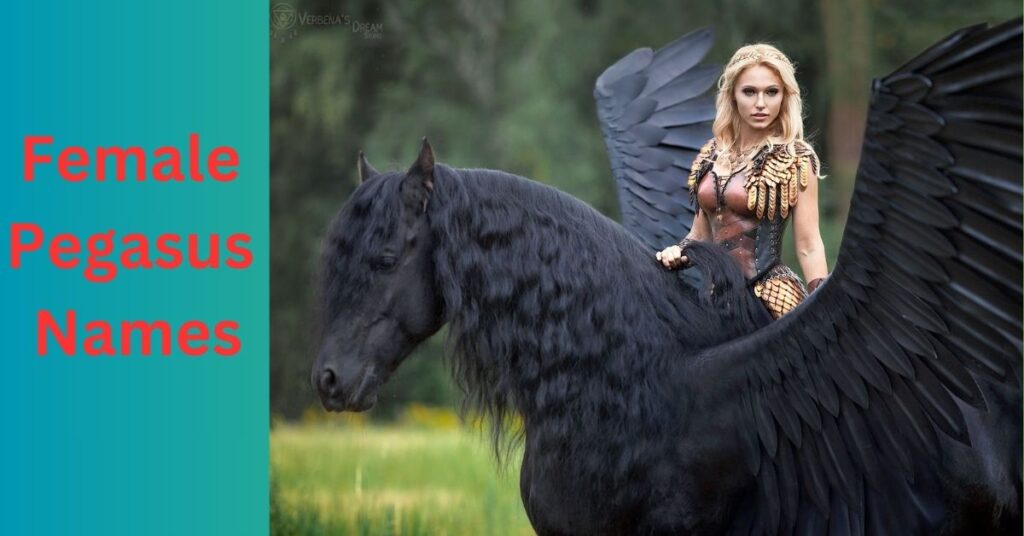
Beautiful and elegant female Pegasus names like Luna, Aurora, and Celeste evoke grace and charm. Inspired by cool mythical names, these choices highlight a feminine, magical spirit. A Greek name for Pegasus, like Nyx or Calliope, adds timeless beauty.
- Ariadne: Symbolizes intelligence and creativity. Originates from Greek mythology, where Ariadne helped Theseus escape the Minotaur’s labyrinth.
- Astra: Represents the stars and celestial beauty. Latin origin, meaning “of the stars.”
- Astrid: Denotes divine beauty and strength. Scandinavian origin, meaning “divinely beautiful.”
- Athena: Embodies wisdom and courage. Greek origin, named after the goddess of wisdom.
- Avalon: Evokes a mystical island of legend. Celtic origin, associated with paradise and Arthurian tales.
- Belladonna: Elegant and dangerous, meaning “beautiful lady.” Italian origin, also refers to a poisonous plant.
- Bellatrix: Latin for “female warrior,” linked to a star in the Orion constellation.
- Bianca: Signifies purity and brightness. Italian origin, meaning “white.”
- Brigid: Represents strength and poetry. Celtic origin, associated with the goddess of fire and wisdom.
- Calypso: Reflects mystery and allure. Greek origin, named after the nymph who detained Odysseus in mythology.
- Callista: Means “most beautiful” in Greek, emphasizing grace and charm.
- Cassiopeia: Refers to a constellation and beauty. Greek mythology, named after a vain queen.
- Celeste: Denotes something heavenly or divine. French origin, meaning “heavenly.”
- Celestria: Elegant and celestial, derived from Latin, meaning “heavenly realm.”
- Circe: Symbolizes enchantment and transformation. Greek origin, named after a powerful sorceress in mythology.
- Cleo: Greek origin, short for Cleopatra, meaning “glory of the father.”
- Dahlia: Associated with elegance and strength. Named after the flower, derived from botanist Anders Dahl.
- Daphne: Greek origin, meaning “laurel,” linked to a nymph transformed into a tree in mythology.
- Electra: Vibrant and electrifying, from Greek mythology, meaning “amber” or “shining.”
- Elysia: Represents bliss and serenity. Greek origin, linked to Elysium, the resting place of heroes.
- Esmeralda: Spanish origin, meaning “emerald,” symbolizing precious beauty.
- Evangeline: Reflects hope and good news. Greek origin, meaning “bearer of good news.”
- Faye: Mystical and magical, derived from Old English, meaning “fairy.”
- Felicity: Represents joy and good fortune. Latin origin, meaning “happiness.”
- Flora: Latin origin, meaning “flower,” linked to the Roman goddess of spring.
- Freya: Norse origin, associated with the goddess of love and beauty.
- Gwendolyn: Symbolizes fairness and strength. Welsh origin, meaning “white ring.”
- Iris: Greek origin, meaning “rainbow,” associated with the goddess of the rainbow.
- Isolde: Symbolizes romance and tragedy. Celtic origin, linked to the Tristan and Isolde legend.
- Jasmine: Represents grace and elegance. Persian origin, named after the fragrant flower.
- Juno: Roman origin, associated with the goddess of marriage and childbirth.
- Juniper: Evokes freshness and protection, named after the evergreen plant.
- Kira: Radiates light and royalty. Persian origin, meaning “throne” or “sun.”
- Lilith: Represents mystery and independence. Hebrew origin, meaning “night.”
- Lorelei: Reflects enchantment and allure. German origin, linked to a siren of the Rhine River.
- Luna: Latin origin, meaning “moon,” symbolizing intuition and femininity.
- Lyra: Evokes harmony and music. Greek origin, named after the lyre, a musical instrument.
- Marigold: Bright and cheerful, named after the golden flower.
- Marina: Symbolizes the sea and tranquility. Latin origin, meaning “of the sea.”
- Medusa: Greek origin, meaning “guardian,” linked to the mythological figure with snakes for hair.
- Miranda: Latin origin, meaning “admirable” or “wonderful.”
- Morgan: Represents mystery and power. Welsh origin, linked to Morgan le Fay of Arthurian legend.
- Nerissa: Evokes the sea’s beauty. Greek origin, meaning “sea nymph.”
- Niamh: Irish origin, meaning “radiance” or “brightness.”
- Nymphaea: Associated with water lilies and grace. Greek origin, meaning “nymph of the water.”
- Odessa: Mysterious and strong, Greek origin, meaning “wrathful traveler.”
- Ophelia: Represents beauty and melancholy. Greek origin, meaning “helper.”
- Pandora: Greek origin, meaning “all-gifted,” linked to the myth of Pandora’s box.
- Penelope: Denotes fidelity and cleverness. Greek origin, associated with Odysseus’s wife.
- Persephone: Symbolizes renewal and the underworld. Greek origin, goddess of spring and the underworld.
- Phoebe: Represents brightness and wisdom. Greek origin, meaning “radiant.”
- Rhea: Motherly and nurturing. Greek origin, associated with the Titaness and mother of gods.
- Rhiannon: Mystical and enchanting. Welsh origin, linked to a goddess of horses and dreams.
- Rosalind: Evokes beauty and grace. Germanic origin, meaning “gentle horse.”
- Sapphire: Symbolizes wisdom and royalty. Greek origin, named after the precious blue gemstone.
- Selene: Embodies the moon’s radiance. Greek origin, associated with the moon goddess.
- Seraphina: Angelic and radiant. Hebrew origin, meaning “burning ones,” linked to celestial beings.
- Serenity: Reflects calm and peace. Latin origin, meaning “tranquility.”
- Soleil: Radiant and bright, French origin, meaning “sun.”
- Stella: Latin origin, meaning “star,” symbolizing hope and guidance.
- Tatiana: Regal and sophisticated. Russian origin, meaning “fairy queen.”
- Tempest: Represents power and storms. English origin, meaning “violent storm.”
- Thalia: Greek origin, meaning “to blossom,” linked to one of the Muses.
- Valeria: Represents health and strength. Latin origin, meaning “strong.”
- Venus: Embodies love and beauty. Roman origin, named after the goddess of love.
- Vespera: Symbolizes the evening star. Latin origin, meaning “evening.”
- Vivienne: Evokes life and vibrancy. French origin, meaning “alive.”
- Willow: Reflects grace and adaptability. English origin, named after the willow tree.
- Zara: Radiant and exotic. Arabic origin, meaning “flower” or “princess.”
- Zinnia: Bright and cheerful, named after the colorful flower. German origin, derived from botanist Johann Zinn.
ALSO READ : Gnoll Names
Pegasus Names from Greek Mythology
Pegasus names from Greek myths include Chrysaor, Pegasus’s sibling, and Zeus, who placed Pegasus in the stars. These Greek names for Pegasus carry historical significance. They connect to ancient tales of gods and heroes, making them powerful names for Pegasus.
- Aeolus: God of the winds, associated with controlling the breezes and tempests. Originates from Greek mythology, symbolizing power over nature’s forces.
- Aether: Represents the pure upper air that gods breathe, symbolizing light and divine essence. Its origin is primordial, as one of the first gods.
- Alcyone: A Pleiad and daughter of Atlas, linked to tranquility and the sea. Represents calm waters and transformation in myths.
- Antheia: Goddess of flowers and flowery wreaths, embodying beauty and nature. Her name reflects her association with blooming life.
- Apollo: God of music, prophecy, and the sun. Known for his twin connection with Artemis, he embodies harmony, knowledge, and healing.
- Ares: God of war, symbolizing raw courage and aggression. Represents strength but also chaos in battle.
- Ariadne: Daughter of King Minos, known for aiding Theseus with the labyrinth. Represents guidance and loyalty.
- Artemis: Goddess of the hunt and wilderness, protector of animals and maidens. Symbolizes independence and nature’s untamed beauty.
- Astraea: Goddess of justice, linked to the stars and purity. Represents hope for divine fairness.
- Athena: Goddess of wisdom and warfare strategy. Represents intelligence, craftsmanship, and just battles.
- Atlas: Titan who holds up the sky, symbolizing endurance and strength. Originates from his punishment by Zeus.
- Bellerophon: A mortal hero who tamed Pegasus to defeat the Chimera. Represents determination and triumph.
- Boreas: God of the north wind, symbolizing the harshness of winter. Known for his powerful and icy temperament.
- Cadmus: Founder of Thebes, credited with introducing the Phoenician alphabet to Greece. Represents civilization and knowledge.
- Calliope: Muse of epic poetry, symbolizing inspiration and storytelling. Often depicted with a writing tablet.
- Castor: One of the Dioscuri twins, symbolizing brotherhood and equestrian skills. Represents protection and camaraderie.
- Cerberus: The three-headed guard dog of Hades, symbolizing vigilance and the underworld’s boundary.
- Charon: Ferryman of the dead, associated with passage and transition. Represents inevitability and acceptance.
- Chimera: A fire-breathing creature defeated by Bellerophon, symbolizing challenges and impossible odds.
- Circe: A sorceress skilled in transformation magic. Represents enchantment and the duality of power.
- Clio: Muse of history, symbolizing memory and the recording of events. Often depicted with scrolls.
- Cronus: Titan father of Zeus, associated with time and cycles. Represents destructive yet necessary change.
- Demeter: Goddess of agriculture, symbolizing growth and sustenance. Central to myths of fertility and the seasons.
- Dione: An early goddess, sometimes identified as Aphrodite’s mother. Represents primal beauty and creation.
- Dionysus: God of wine, revelry, and theater. Symbolizes joy, freedom, and chaos.
- Elysium: Paradise in the afterlife, representing eternal bliss and reward for virtuous souls.
- Eris: Goddess of discord, symbolizing strife and competition. Represents chaos and rivalry.
- Eros: God of love and passion, symbolizing desire and connection. Represents primal attraction and creativity.
- Eurydice: Wife of Orpheus, symbolizing love and loss. Represents the fragility of life and devotion.
- Gaia: Primordial goddess of the Earth, symbolizing creation and sustenance. Represents the natural world’s life force.
- Gaea: Alternate name for Gaia, emphasizing her role as Earth’s personification and mother of life.
- Hades: God of the underworld, representing death and the afterlife. Known for his stern but fair rule over the dead.
- Harmonia: Goddess of harmony, representing balance and unity. Often associated with peace in relationships.
- Hebe: Goddess of youth, symbolizing vitality and renewal. Represents eternal beauty and freshness.
- Hecate: Goddess of magic, crossroads, and the moon. Symbolizes mystery, protection, and transformation.
- Hemera: Goddess of daylight, representing clarity and illumination. Embodies the beauty of a new day.
- Hera: Queen of the gods, goddess of marriage. Represents loyalty, family, and divine order.
- Hercules: Demigod hero known for his twelve labors. Represents immense strength, courage, and redemption.
- Hermes: God of travel, trade, and communication. Symbolizes ingenuity and swiftness.
- Hestia: Goddess of hearth and home, symbolizing warmth, family, and stability.
- Hippocampus: A mythical sea horse, half horse and half fish. Represents maritime travel and Poseidon’s realm.
- Hypnos: God of sleep, symbolizing rest and dreams. Represents peace and the subconscious.
- Jason: Hero who led the Argonauts to find the Golden Fleece. Represents leadership and perseverance.
- Leto: Mother of Apollo and Artemis, representing motherhood and protective instincts.
- Medusa: A Gorgon whose gaze turned people to stone. Represents danger and transformation.
- Persephone: Queen of the underworld, symbolizing seasonal change and rebirth. Represents duality and balance.
- Perseus: Hero who slew Medusa, symbolizing bravery and cleverness. Represents overcoming impossible challenges.
- Phaethon: Son of Helios who tried to drive the sun chariot. Represents ambition and its risks.
- Phoebe: Titaness associated with the moon and prophecy. Symbolizes light and wisdom.
- Poseidon: God of the sea, earthquakes, and horses. Represents power, unpredictability, and the ocean.
- Prometheus: Titan who gave fire to humanity, symbolizing defiance and innovation. Represents sacrifice for progress.
- Rhea: Titaness and mother of the Olympians, representing nurture and protection.
- Stheno: A Gorgon sister of Medusa, known for her strength. Represents untamed ferocity.
- Styx: River of oaths in the underworld, symbolizing unbreakable promises and boundaries.
- Thanatos: God of peaceful death, representing transition and inevitability.
- The Muses: Nine goddesses inspiring art and science. Represent creativity and divine influence.
- Theseus: A hero who defeated the Minotaur, symbolizing ingenuity and courage.
- Zephyros: God of the west wind, symbolizing gentle breezes and spring. Represents renewal and calmness.
- Zeus: King of the gods, ruling over the sky and thunder. Represents authority, justice, and power.
Cool Pegasus Names
Cool Pegasus names like Shadow Wing, Sky Blaze, and Stormchaser exude strength and mystery. These names for a Pegasus reflect adventure and wonder. A name for a flying horse that sounds bold enhances the creature’s magical allure.
- Aero: Represents the swiftness of air, symbolizing speed and agility. Originates from Greek, meaning “air” or “sky.”
- Blaze: Signifies fiery energy and unstoppable spirit. Reflects power and passion, evoking images of flames in flight.
- Celestial: Highlights a heavenly, otherworldly grace. Suggests divine elegance and cosmic origins.
- Cobalt: A cool and strong name inspired by the deep blue mineral. It symbolizes strength and calmness.
- Cosmic Flare: Evokes the brilliance of a starburst in space, symbolizing radiant power and mystery.
- Ember: Represents smoldering intensity and quiet strength. Derived from the glowing remnants of a fire.
- Frostfire: A unique blend of ice and flame, symbolizing duality and balance in strength.
- Fury: Embodies raw energy and relentless power, inspired by tempestuous storms and mythical rage.
- Galadriel: A Tolkien-inspired name, representing wisdom, light, and ethereal beauty.
- Hurricane: Captures the force and chaos of nature’s might, reflecting unmatched power.
- Jetstream: Represents high-speed winds, symbolizing agility and unstoppable momentum.
- Mystic Wings: Suggests magical and enigmatic qualities, symbolizing a Pegasus of mystery and charm.
- Mystique: Embodies a sense of allure and mystery, inspired by magical realms.
- Nebula: Inspired by cosmic clouds, symbolizing vastness and celestial wonder.
- Nimbus: A glowing cloud or halo, symbolizing divine or ethereal presence.
- Onyx: Represents a sleek and mysterious aura, inspired by the black gemstone symbolizing protection.
- Phoenix: A name tied to rebirth and eternal strength, inspired by the mythical bird of fire.
- Quicksilver: Suggests speed and fluidity, named after the silvery metal mercury.
- Ravenwing: Highlights dark elegance and swift movement, inspired by the sleek beauty of a raven in flight.
- Riptide: Symbolizes the force and unpredictability of ocean currents, reflecting dynamic strength.
- Sapphire Wings: Represents beauty and grace, inspired by the precious gem known for its deep blue color.
- Seraphim: A celestial name denoting angelic purity and divine strength.
- Shadow Flyer: Evokes mystery and stealth, symbolizing quiet but powerful motion.
- Solaris: A radiant name reflecting sunlight and warmth, symbolizing energy and life.
- Storm Chaser: Represents daring and adventure, inspired by the pursuit of powerful storms.
- Tempest: Symbolizes a stormy and fierce presence, reflecting intense energy.
- Thunderbolt: Evokes the sudden power and might of a lightning strike, symbolizing electrifying speed.
- Velocity: Highlights unparalleled speed and agility, reflecting a focus on swiftness.
- Vortex: Suggests swirling power and unstoppable energy, inspired by whirlwinds.
- Zenith: Represents the peak or highest point, symbolizing excellence and achievement.
Unique Pegasus Names
Looking for something rare? Try unique Pegasus names like Solara, Astralis, or Zephyra. These flying horse names stand out and spark imagination. A creative Pegasus name is perfect for a one-of-a-kind mythical creature.
- Aeris: Represents “air” or “wind” in Greek, symbolizing lightness and freedom. It evokes a sense of soaring above the clouds.
- Aetheria: Derived from “aether,” the upper air where gods reside in Greek mythology, representing ethereal beauty and celestial energy.
- Aetherion: A majestic name linked to the pure upper atmosphere, embodying transcendence and divine connection.
- Arielis: A melodic twist on “Ariel,” meaning “lion of God,” reflecting strength and grace in flight.
- Apollo: Named after the Greek god of the sun and arts, symbolizing brilliance, inspiration, and power.
- Astraeus: Rooted in Greek mythology as the god of dusk and stars, representing the cosmic and mysterious.
- Bellerophon: Known as the hero who tamed Pegasus in Greek mythology, symbolizing courage and mastery.
- Celestial: Refers to the heavens, embodying divinity and an otherworldly presence.
- Celestria: A poetic variation of “Celestial,” exuding elegance and connection to the stars.
- Dazzle: Reflects brilliance and sparkling radiance, evoking awe and wonder.
- Draconis: Inspired by dragons, representing strength and mythical power.
- Elysian: Refers to the “Elysian Fields” in Greek mythology, symbolizing paradise and bliss.
- Elysium: Another term for the afterlife’s paradise in Greek lore, signifying peace and eternal beauty.
- Emberlyn: Combines “ember” and “lyn,” evoking fiery warmth and resilience.
- Fae: Short and magical, inspired by fairy lore, symbolizing enchantment and agility.
- Frostfire: A unique contrast of frost and flame, embodying balance and power.
- Galaxia: Represents galaxies, tying to vastness and cosmic wonder.
- Galaxy: Simple yet profound, symbolizing infinite possibilities and celestial grandeur.
- Halcyon: Derived from Greek mythology, symbolizing calm and serenity amidst storms.
- Hurricane: Embodies raw power and unstoppable energy, evoking awe in nature’s might.
- Icarus: Rooted in Greek mythology, symbolizing ambition and daring flight.
- Jetstream: Represents swiftness and the natural currents of the sky, making it sleek and modern.
- Kestrel: A nod to the small but fierce bird of prey, symbolizing agility and sharp focus.
- Luna: Latin for “moon,” symbolizing mystery, calm, and celestial connection.
- Lunaria: A poetic extension of “Luna,” adding floral and lunar elegance.
- Mystique: Conveys enigma and allure, perfect for a Pegasus with hidden depths.
- Nebulon: Inspired by nebulae, representing the birth of stars and cosmic beauty.
- Nimbus: Evokes clouds and radiance, tied to divine presence and celestial majesty.
- Nyx: Derived from the Greek goddess of night, symbolizing mystery and shadowy grace.
- Orion: Linked to the constellation, representing guidance and celestial navigation.
- Orionis: A refined form of “Orion,” emphasizing starlight and cosmic elegance.
- Pegasus: The iconic winged horse from Greek mythology, representing freedom and inspiration.
- Quasar: A celestial body emitting intense light, symbolizing radiance and energy.
- Ravenwing: Combines the darkness of ravens with the flight of wings, exuding power and mystery.
- Sapphire: Represents preciousness and a deep blue hue, tying to celestial calm.
- Siren: Inspired by Greek mythology, symbolizing allure and hypnotic beauty.
- Solara: Derived from “solar,” symbolizing the sun and its radiant energy.
- Starfire: Combines the brilliance of stars with fiery energy, symbolizing passion and cosmic beauty.
- Sundance: Represents joy, light, and the playfulness of sunlight.
- Sylph: Tied to air spirits, representing ethereal grace and lightness.
- Tempest: Reflects strength and the chaotic beauty of storms.
- Thalassa: Greek for “sea,” symbolizing serenity and the blending of ocean and sky.
- Urania: Named after the muse of astronomy, symbolizing wisdom and connection to the cosmos.
- Valkyrie: Inspired by Norse mythology, representing strength and celestial guardianship.
- Vesper: Latin for “evening star,” symbolizing calm and twilight elegance.
- Vortex: Suggests swirling power and dynamic energy, embodying unstoppable force.
- Whirlwind: Symbolizes swift, unpredictable movement and raw energy.
- Xenon: A rare gas that glows brightly, symbolizing uniqueness and radiance.
- Yonder: Represents the distant and unknown, evoking mystery and adventure.
- Zephyr: A gentle west wind in Greek mythology, symbolizing lightness and freedom.
- Zephyra: A feminine variation of “Zephyr,” evoking grace and the spirit of the wind.
- Zephyros: Another form of “Zephyr,” emphasizing connection to ancient Greek culture.
- Zephyrus: Rooted in Greek mythology as the personification of the west wind, representing soft breezes and renewal.
FAQs
What are Pegasus’ names?
Pegasus is often simply referred to by its name “Pegasus,” derived from Greek mythology. However, creative interpretations in literature, games, and media have given Pegasi various names like Silverwing, Starfire, or Cloud Dancer, symbolizing their celestial and ethereal nature.
What is the real name of a Pegasus?
The original Pegasus in Greek mythology does not have an alternate “real” name; it is known simply as Pegasus. This legendary winged horse was born from the blood of Medusa and has always been recognized by this singular name.
What do you call a Pegasus?
A Pegasus is often referred to as a “winged horse” or simply by its mythological name, Pegasus. In broader contexts, the term “Pegasi” may be used to describe multiple winged horses in fantasy settings.
What is another name for Pegasus?
Another name for Pegasus could be “Celestial Steed” or “Sky Charger,” depending on creative interpretations in fantasy works. While the original mythology does not provide alternate names, these terms capture its divine and aerial attributes.
What is a mythical Pegasus?
A mythical Pegasus is a legendary winged horse from Greek mythology, often associated with heroism and divine inspiration. Known as the offspring of Poseidon and Medusa, Pegasus is celebrated for aiding heroes like Bellerophon in their quests.
Who is Pegasus’ twin?
Pegasus’ twin is Chrysaor, a golden warrior born simultaneously from Medusa’s blood. While Pegasus embodies grace and flight, Chrysaor symbolizes strength and terrestrial power in Greek mythology.
Conclusion
Pegasus’ names are full of wonder and magic, capturing the charm of these mythical creatures. From classic Greek mythology to creative modern stories, these names reflect the beauty and power of winged horses. They inspire imagination and make each Pegasus unique in its tale.
Understanding Pegasus names connects us to ancient legends and shows how myths grow over time. These names are more than words; they bring stories to life and spark a sense of adventure in every fan of mythology.

Helen Lisa is the admin of our platform dedicated to exploring the meanings and origins of names. With a deep interest in linguistics and culture, she curates insightful content to help users uncover the stories behind names. Helen’s expertise ensures a valuable and engaging experience for our audience.
